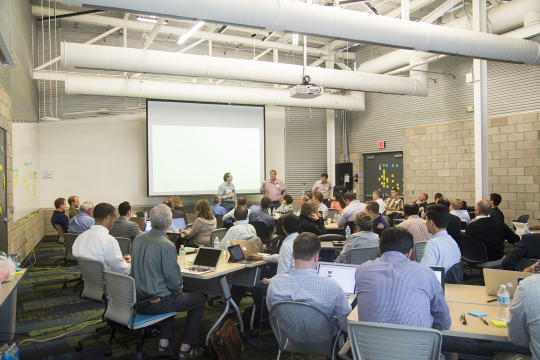
Before you invest your life’s savings and precious time in a new business venture, wouldn’t you like to know there’s a market for what it will offer? Seems like a sage idea. But, in fact, startups are often launched based on a founder’s blind passion rather than on any proof that his product will sell.
Concept Academy, a startup-coaching initiative from the business development firm Rev1 in Columbus, Ohio, is helping entrepreneurs navigate that early stage. The year-old program offers an intensive three-day workshop that shows founders how to determine demand before creating a supply.
Rev1’s founders preach: “Acquire customers first, then build products.” Rev1’s EVP, Investments & Venture Acceleration, Wayne Embree, points to a CB Insights survey of failed companies’ founders; it found that 45 percent built products for which there were no customers. “We’re saying, ‘before you go out and build it, stop and ask some people’.”
He calls the Rev1 approach “data-driven market validation.” To date, he says 150 startups have passed through the invitation-only program, and just 30 percent proved that market demand for their idea existed.
Enrollees are mostly people with technology business ideas—in software, life sciences, diagnostics, IT, advanced materials, agriculture, and food technologies. About one-quarter of the concepts tested so far have been developed in research institutions such as Ohio State University, Battelle Memorial Institute, and Nationwide Children’s Hospital.
“In cases where the idea isn’t that great, the data will tell,” Embree says. That doesn’t necessarily mean failure, however. “In some cases, there is not a market, but we want to work with the entrepreneur on another company or another iteration.”
Embree says the Concept Academy pushes participants to conduct “an intellectually honest assessment.” The program shows them how to define their audience, identify their buyers and users, conduct market research, and validate results. “We teach them how to go out and do high-level surveys of those parts of the market to determine if people are interested in the product or the feature set they’re putting together,” he says.
Sometimes, that’s a matter using online polling instruments and getting results in a half hour. In the case of an esoteric neuroscience technology, the founder had to pick up the phone and speak to executives at the only 6 companies that would be his customers.
“The key component is engaging with more customers early and doing it in an intellectually honest fashion,” Embree says. “Human beings, left to their own devices, are going to gravitate towards getting the answer they want, not the one they need. We celebrate the people who come back at end of three days and say, ‘I don’t have a market. I’m going to fold this idea up and do another one.’”
Embree notes that, for a lot of tech concepts, it’s important for founders to understand that the user and buyer are not the same. For instance, an entrepreneur might be convinced that surgeons will want to use a medical device, but the hospital is the buyer. “It used to be that if the surgeon wanted it they got it, but with the Affordable Care Act, you have to show efficacy and low cost before a hospital will buy,” says Embree.
Of the 150 companies that have been through the Concept Academy to date, Embree says the Rev1 team has engaged more deeply with about 40 of them. “That’s where we do the heavy lifting,” he says. “Unlike an accelerator that has a ‘CEO Day’ and then funds a handful, we nail down quickly which ones we will work with over the course of year.” Rev1 invested between $25,000 and $400,000 in about 30 of the companies it worked with last year, and expects to invest $25 million this year, according to Embree.
One Concept Academy success story is a company called Nexosis that believed its predictive analytics platform would sell well in the gaming industry. Market research it did with Rev1’s guidance showed that demand would be stronger elsewhere. The founder changed directions and his first customer—a large bottling company that uses the platform to predict how much beverage to ready for distribution—also became an investor.
Co-founder Ryan Sevey says, “Had we not gone through Concept Academy, we would’ve been going down the wrong path and would not have been developing something the market really wanted. Instead, within a few months of working with Rev1 and strategic investors, we were able to secure clients who told us they would buy the solution we were building.”
Says Rev1 Chief Marketing Officer Kristy Campbell, “The cool part is that founders learn skills they can use ongoing in their business. There are major companies that have mastered this, such as 3M and P&G. We try to get people to understand that this is a lifetime skillset.”
Embree believes the innovative Rev1 approach will catch on elsewhere. “We’re able to work with more companies than a traditional accelerator and they’re coming out with products that we know the market needs,” he says. “We work with them longer, but they come out much more set up for success.”
For more advice from Wayne Embree, Kristy Campbell, and their colleagues at Rev1, see 6 Steps to Early State Startup Success in Yahoo’s Profit Minded blog.
Follow Adrienne Burke @adajane




